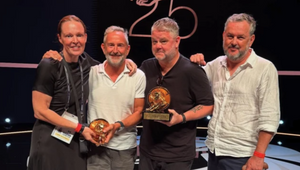
5 Minutes with... Brent Smart

In the ever-changing world of marketing, sometimes it feels like data points and decisions by committee can seem to smother original and challenging thinking. In this landscape, few senior marketers make sufficient impact to carve a name for themselves that rises above the usual boardroom chatter.
One such person, however, is current Telstra CMO Brent Smart, who having begun his career as a suit in Melbourne, enjoyed a stellar agency journey that took him from from Australia to NY, stopping off in Auckland and San Francisco en route.
As part of a wave of influential Aussies in the US, his four year tenure as CEO of Saatchi & Saatchi New York was seen as defining a new guard of smart thinkers reshaping the US agency landscape.
In 2017 Smart made an unexpected, but welcome, return to his homeland to shift client-side running marketing at insurance giant IAG, before landing in his current position as CMO for iconic Australian telco Telstra.
Earlier this year he made a bold move to shakeup Telstra’s incumbent agency roster. Appointing a bespoke mix of indie creative, holding group and media partners under the umbrella brand of ‘+61’, named after Australia’s international dialling code in a nod to the telco’s heritage.
In his Q&A for LBB, Smart unveils his personal journey, unpicks the power of creative tension and reveals why intuition trumps data every time.
LBB> Brent, tell me something about your background. Did you grow up in a creative household, and how did you find yourself in the land of creativity and advertising?
Brent> My childhood couldn’t have been less creative, growing up in an uninspiring outer suburb of Melbourne with a dad who worked in insurance. I sucked at art, and all I ever wanted to be was a lawyer. My only creative outlet was The Beatles.
I missed out on getting into law by one solitary mark out of 400 for the HSC. I didn’t really have a plan b, and drifted through a business degree until a marketing professor in my final year thought I’d be a good fit for advertising and recommended me for a graduate role at the famous agency that no longer exists George Patts. She was right.
LBB> The trajectory of your career has seen you incorporate both creativity and commercialism in equal doses. How do you manage this balance, and is there a benefit from the tension created by mixing ‘art’ with business?
Brent> There is a pervading sense in the business world that creativity is risky. But the opposite is true. The biggest risk a marketer faces is to do something boring that no one notices or remembers. I don’t champion creativity to win awards or for my ego, I do it because it is the most commercially smart decision you can make as a marketer if you want to be effective.
The tension comes from the fact that nothing is as good at killing an idea as a corporation. So to manage that tension, you need to really protect ideas and create a culture of trust, which requires a clear strategy, strong conviction, and constant demonstration of the commercial value you are creating.
LBB> Your career has taken you from running some of the world’s highest profile agencies, to client-side positions with huge consumer brands. What are the similarities in these roles, and what is markedly different?
Brent> The similarity between a client-side role and leading an agency is that creativity is the key to your success in both. The big difference is that in a client-side role you have more control over whether that creativity lives or dies.
That’s why I became a marketer.
After 20 years working in agencies, I became increasingly frustrated with the right ideas dying because they didn’t have a marketer on the other side who believed in them. I thought if I could be in a position where I could say yes to an idea and create the conditions for that idea to be great, then I could have a bigger influence on the work. That liberation of being able to say yes to an idea is why I love being a CMO.
LBB> Your tenure at IAG was seen as one of the most successful of recent times, with many of the campaigns you introduced still running. What drew you to Telstra, and what are you hoping to achieve?
Brent> Thank you for the kind words about my time at IAG, I’m still very proud of the body of work we created on the NRMA brand.
What drew me to Telstra was the challenge. One of the biggest Australian brands that is part of the cultural fabric of this country. A brand that polarises with some very real reputational challenges that I believe great brand marketing can shift.
We have big creative ambitions and I want us to be the most creative brand from this part of the world. For a brand that has won a solitary Cannes lion in the last 20 years that is a big aspiration, but I believe we have the team, the partners and the support from our leadership to get there.
LBB> A huge consumer brand like Telstra holds millions of data points on customers and prospects, so how does this level of data influence the creative choices you make? Is there still a place for intuition in delivery of brand campaigns?
Brent> Like many big businesses we are data-rich, but insight-poor. No data can tell you what creative choices to make, only diagnose the problem you are trying to solve and measure the choices you made in hindsight.
Any truly creative idea requires a leap, and that leap comes from a mix of gut feel, taste, your experience and trust in your partners. The simple question I always ask myself is how does it make me feel? That’s all intuition and I don’t believe anything can take its place.
LBB> You recently introduced a very innovative agency model +61, it’s certainly a bold move and reasonably unique for Australia. What was your thought process in putting this together, and what made you move away from a more conventional arrangement?
Brent> I wanted to start with a blank sheet of paper and design an agency model that was creatively-led and truly integrated, without having to make compromises to handle the scale and speed of Telstra.
What if you could have the singular vision and level of care of a creative independent agency and the capabilities and resources of a large network agency?
What if you could put creative and media back together in a truly integrated way of working?
+61 answers these questions in a way that brings three very different agencies and capabilities together – Bear Meets Eagle on Fire, TBWA and OMD - in an equal partnership model and integrated way of working.
At the same time, it reduces the duplication and inefficiency of our old agency roster, delivering not only savings, but enabling us to reinvest in more strategic and creative resources than we had previously.
LBB> The CMO/ agency relationship is crucial for success in your role. What do you look for in your agency partners, and is great creative on its own enough in today's performance-driven environment?
Brent> Agencies bring outside perspectives, which is critical. Any marketer gets too close to their business and you need partners that are closer to the customer and to culture to bring you bigger thinking and more original ideas than what you could have come up with yourself.
The thing I look for most in an agency partner is a strong opinion. And then I look for an obsession with craft, because that’s what elevates the great work from the good.
LBB> You were part of the judging panel for the AUNZ leg of this year’s LBB Immortal awards. How do you think we are stacking up in the region as a global creative force?
Brent> It was such a privilege to be the client invited along to judge with some of this region’s best creative leaders, who I admire, so thank you.
I really like what you’re doing with the Immortals. The last thing we need is another award show, but I like the way you have taken away entry fees and categories and awarded only the very best work. It gives the awards integrity, and keeps the standard very high. I really want to win one.
LBB> What’s next from Brent and Telstra in 2024?
Brent> We are working on a new brand expression for Telstra. Whilst we have created some nice work in the last 12 months that has moved the brand forward and been well received, we have lacked a clear unifying idea for the brand. That is job number one for +61 and the first glimpses of the creative work is very exciting, I can't wait to get it out into the world next year.















